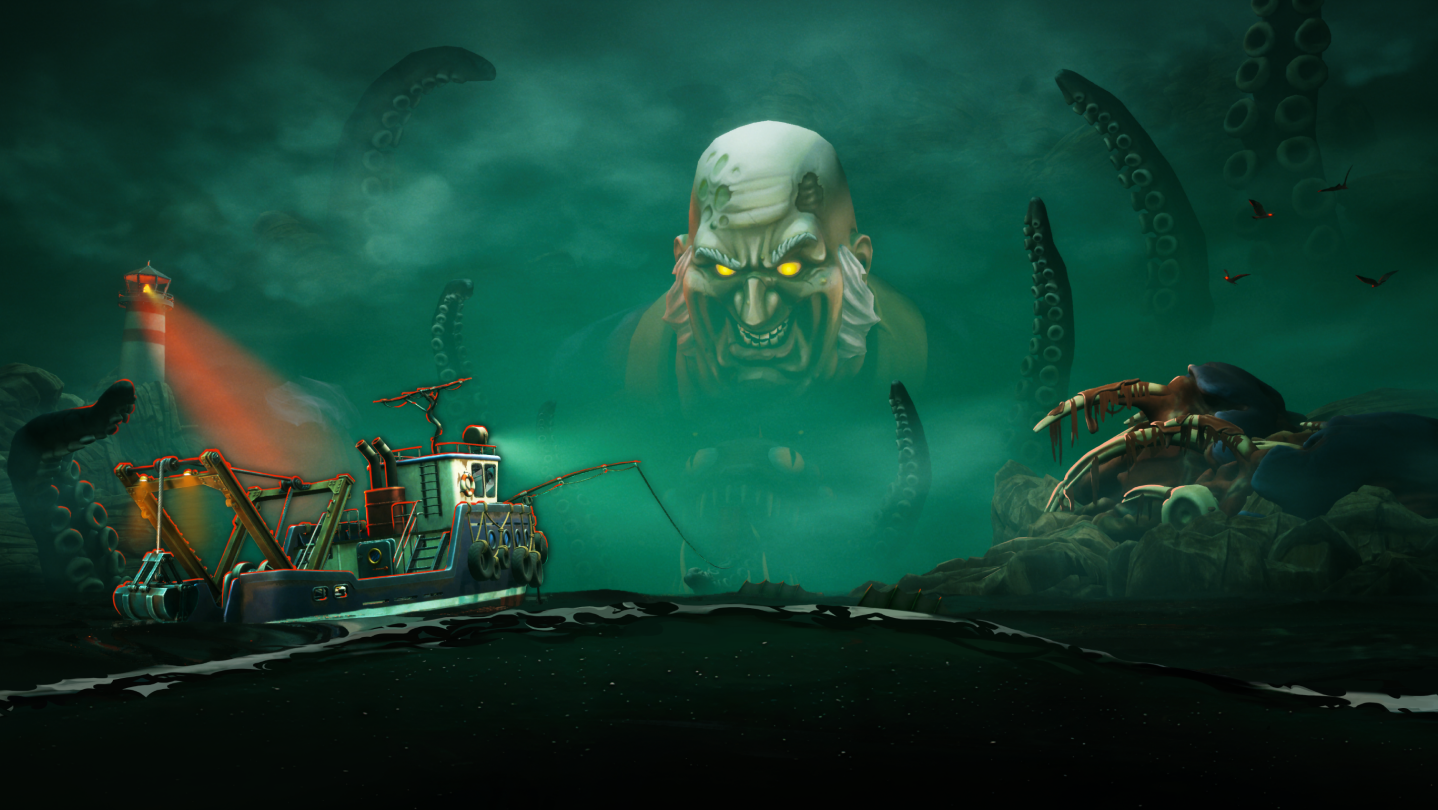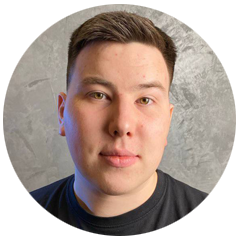Recently, there was an announcement for DreadMoor, an adventure game about fishing in a post-apocalyptic world with nods to the indie hit Dredge. The App2Top editorial team spoke with Rostislav Fedorov, CEO and co-founder of the Russian studio Dream Dock Games, which is developing the game, to discuss the team, the project, Wishlist targets, and budgets.
Alexander Semenov, App2Top: Hi! Congratulations on the announcement of DreadMoor. How did it go?
Rostislav Fedorov
Rostislav Fedorov, Dream Dock Games: Hi! It was very intense! We didn't expect such a buzz on the first day. We can hardly keep up with players' inquiries. But I haven't drawn any concrete conclusions yet, as it's only the third day. We'll see the results at the end of the month. I'm currently guardedly optimistic.
Let’s start by talking about your team. Tell us a bit about it: how long ago was it founded, where is it located, how many people are there, and what projects have you worked on before?
Rostislav: Officially as Dream Dock, we've existed for only five months. But as a team, we've been working together for over two years.
We are mostly based in Russia and Belarus, but we have team members in other countries as well, since we work remotely.
Over the past two years, we've worked on major projects under strict NDA, so we can't talk about them for the next three years. But previously, our specialists worked on projects like World War Z, Pathfinder: Wrath of the Righteous, Fatal Zone, GardenScapes, Hustle Castle, and Zero City.
You just mentioned the studio is Russian, yet many Russian media outlets persistently refer to it as Polish. How did that happen?
Rostislav: This is a sore point for us. It started when a local publication mentioned the studio was Polish, despite it not being stated on our website or in our press kit. Since then, this misinformation has been spreading from article to article.
I believe the confusion arose because the studio's LinkedIn page was created as a Polish one, as that's the only way to get a VIP account. However, as I reiterate, the studio is based in Russia, and our developers are from Russia and Belarus.
Okay, we’ve clarified that. Let’s get back to the studio's history. Was there a catalyst event that made you realize it was time to develop your own game?
Rostislav: Yes. We completed an outsourcing AA project that we had been working on for over two years. Then the client said, "That's it, we're done, thank you." So we entered the job market and naturally asked ourselves: maybe it’s time? Maybe the tomatoes are ripe on the vine?
From the video and description, it’s clear you set out to create your version of Dredge. Why that particular game?
Rostislav: Actually, it's not just that game. But I think the little boat and tetris inventory did their marketing magic! As recent events showed, this approach worked very well.
Regarding the choice of Dredge: we didn't land on it immediately, it was a gradual process. Initially, there was an idea to combine The Long Dark with fishing: I was looking at the Russian fishing simulator and was just amazed by its success and how in-demand fishing games were.
Then it kind of shifted towards Lovecraft, and eventually became very similar to Dredge. In the end, we thought: let's go for it; if we have a boat, let’s add a fishing net at the back, and the audience should "bite." And they did!
In your press release, you mentioned selling a car to fund the new project. What's the story behind that? What kind of car was it, and could it really cover the development costs?
Rostislav: You’ll laugh, but we sold two cars: a Volkswagen Tiguan and a Ford Explorer.
Both were practically new.
The story is pretty simple: we're at our computers 24/7 anyway. We believe in this product, so we're risking what we can to create something our kids will play with.
Obviously, the money from selling a couple of cars isn't enough for such development. We also have long-standing savings. But even that might not be enough.
Since we’re talking about money, can you share the game’s budget? Or at least give a ballpark figure for teams who might read about you and assess their financial ability.
Rostislav: This is an ambitious AA project, not for beginners. We understand this and are realistically assessing our capabilities. According to our calculations, development will cost at least $700,000. However, we anticipate that profits from PC and consoles will be significantly higher. Even capturing a 5% share of Dredge’s success could already put us in a good position.
However, I would advise teams to start with something small. Here's an insider tip: we're also working on another project in parallel, which is small with quick development timelines and good potential. For indies, I think that's the best route.
Don’t rush into thinking you’ll make your own Assassin’s Creed.
So, you decided to create your own Dredge. Do I understand correctly that something was missing for you in the game by Black Salt Games? Please share what specifically? Also, how long was the list of "wants" when development started?
Rostislav: No, overall Dredge is a good game, we want more!
If I were to pinpoint something, it's that the gameplay can become monotonous quickly. There are no peaks and valleys of motivational states; you simply catch fish and upgrade the ship, in a relatively short gameplay loop, making it hard for some in the audience to engage fully. We plan not to let such aspects occur. Nonetheless, it is an excellent product — kudos to Black Salt Games.
Our game will be fundamentally more atmospheric, with story and adventures.
As for the "wish list": it doesn’t get any shorter over time. The key is identifying the threshold for a minimally viable product, prioritizing, and sticking to it. In my experience, sometimes a client requests minor details be fixed numerous times, like a small feature on a massive mechanical structure or a dent in a character’s knee – things players won’t notice but which consume significant budget. Hence, we will prioritize what the player will focus on and enjoy.
Were there things you had to ultimately give up?
Rostislav: Yes. We currently dropped the simulation of water interaction. It's when, for example, a monster swims by, and waves ripple from it. Technically—expensive. We faked it with VFX for now, but aim to implement it in the future—we’re already working on this.
Ultimately, how will DreadMoor fundamentally differ from Dredge, besides having a cooler production?
Rostislav: Let me summarize:
- First-person view;
- Deeper narrative;
- More mechanics;
- Richer visual content;
- Linear storytelling (yes, there will be a plot and cutscenes);
- A world with unique mechanics;
- Presence of radiation;
- Possibility to run on land and fight creatures;
- Crafting system (includes various baits and gathering as well).
And that's not all!
Can you describe the gameplay in broad strokes?
Rostislav: It will hinge on a final goal. We will progress through the storyline to achieve it.
The world will consist of separate locations. Similar to Metro Exodus: as you progress through the story, you move to a new location with its own small open world. Within it, you can work on progress. This way, we can effectively manage the progress curve.
The cycle is simple. There are quests—complete them. There is a boat—upgrade it. There is equipment—improve it.
To upgrade, you need materials and money. To earn money, you need to catch and sell fish. Plus, a rare fish might provide a material necessary for crafting equipment that increases resistance to radiation.
To craft equipment or a new harpoon, you need blueprints. These are found on land. To discover them, you must search buildings. Meanwhile, keep your wits about you, so you don’t get caught off guard by a ghoul around the corner.
Even though you’re not cloning but expanding on the original, aren’t you concerned that people will view the game with preconceived notions?
Rostislav: No. We have a unique product. Many will realize this when the demo is out. Plus, many have already referred to the game as an improved version of Dredge. I think that’s not a bad thing.
The project, judging by the video and screenshots, has been in development for a while: why did you maintain radio silence for so long? Nowadays, the indie community tends to go public as early as possible, partly to build wishlists from the start.
Rostislav: I both agree and disagree with that belief. If there’s no game, if you only have a gray cube to show on social media, it’s a poor promotional method. A single GIF won’t sustain interest.
The project should stand out at least a bit among thousands of similar projects for a player to add it to their wishlist. You shouldn’t rely on people who support indie with a wishlist but may never buy the game.
For us, it was clear from the start: the announcement needed to be WOW, explosive, a bombshell! You can't achieve that effect with a gray cube, so we decided to polish up to a solid news event.
Judging by your Steam page, you decided to launch the project independently, without a publisher. Why?
Rostislav: We have basic knowledge of how it’s done. We had money for the announcement, and most importantly, wanted to understand if the public was interested in the game without any intermediaries. If there’s interest, it leads to entirely different, more beneficial terms with a publisher or investor.
Since publishers and investors might be reading, I must ask: are you open to considering interesting offers?
Rostislav: Yes, we are open. We welcome contacts and interesting collaboration proposals!
Will you release through early access or directly to full release?
Rostislav: The situation with early access suggests that a full release is preferable. We’ll see closer to the time.
When can we expect the game to be released?
Rostislav: We aim for the end of 2026. We hope to make it on time.
Last question: what are your expectations for the project, what are you waiting for, and what are you prepared or not really prepared for?
Rostislav: Of course, we believe in success! We’re ready for anything.
We’ve put maximum effort and more into this. All our accumulated experience.
That’s how the world works: to get something, you need to give something. We’ve given—we’re waiting for our reward.









